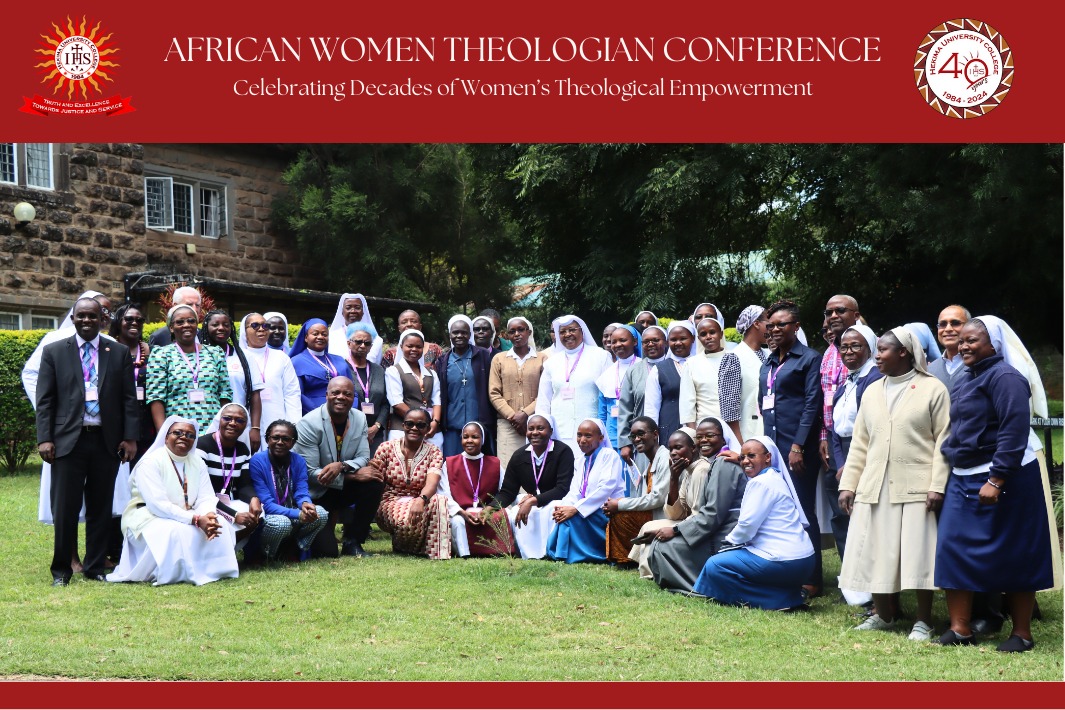
As Hekima University College continues to celebrate its 40th Anniversary, most of the activities scheduled to take place as part of the jubilee celebrations have already successfully been achieved. With the jubilee year drawing closer to the end, the college looks back with gratitude as some of these events which happened to be the first of a kind in the history of Hekima unfolded. HUC Principal Rev. Dr. Marcel Uwineza noted that although the institution has endeavored to offer opportunities to women theologians, their voices are still rarely heard, therefore as part of the celebrations of HUC’s 40th anniversary, the institution deemed it fit to hold a unique conference for African Women Theologians in a bid to celebrate their contributions as well as amplify their voices in the theological discourses. For the last four decades, Hekima University College has been a predominantly male, institution owing to its primary purpose, which was to provide theological formation for individuals destined to become Catholic Priests. Although the trends are changing elsewhere, especially in the Global North where more women are embracing theological studies, Hekima University College has since redefined its mission to be more inclusive and is thus making history as an African Theological Institution where more women are encouraged to take up a historically male, ordination-oriented course.
The Ignatian Scholarship Fund for Religious Women is one such initiative of Hekima University College to get more African women to study theology. In addition to that is the Hilton Hekima Sisters Scholar Program, which offers an introduction to theology to African Religious sisters to realize the importance of theology in their apostolates. Owing to the number of religious sisters that have shown interest in these programs, one can only deduce that the number of African Women Theologians is bound to rise in the not-too-far future.
Hekima University College’s conference from 7th to 10th March on African Women Theologians witnessed powerful presentations from Women theologians. Among them, Prof. M. Shawn Copeland, Prof. Lisa Cahill (both from Boston College, USA), Prof. Teresa Okure, Prof. Josee Ngalula, Dr. Leocadie Lushombo, and Prof. Mary N. Getui were keynote speakers. There were a total of 25 paper presentations covering Systematic Theology and Synodality, Canon Law and Synodality, Church and Synodality, Bible and Synodality, Peacebuilding and Synodality, as well as Pastoral Theology and Synodality. Dr. Uwineza described the event as a dream come true. Speaking at the closing ceremony of the conference, the Archbishop of Nairobi, Most Rev. Philip Anyolo expressed that the conference is a sign of hope for the future of the church in Africa.
“As I look out at this gathering of brilliant minds and compassionate hearts, I am filled with immense hope for the future of our Church, a future where the voices of African Women Theologians will not just be heard, but will become a resounding chorus that shapes the very core of our synodal journey,” said Archbishop Anyolo.
While mentioning women who have contributed to theological discourses from the biblical days to today’s contemporary world, Archbishop Anyolo told the women theologians that the church needs the richness of their perspective to address the challenges of our times: “Let your femininity, a wellspring of creativity, empathy, compassion, and nurturing strength, be the very essence of your theological exploration.”
The Archbishop urged the women theologians to engage with the challenges facing their communities such as poverty, gender inequality, and environmental degradation by offering theological frameworks that foster healing and hope. He urged them to be the bridge between the academic and the lived realities of people on the ground: “Let your lived experiences as mothers, daughters, sisters, and leaders inform your theological discourse.”
As the dust settled on the conference, most concluded that a short chapter in African Catholic history had been written, and that, no doubt, a ball was set in motion. The need for African Women in theology is undisputable; the quest now is to make their presence a reality. Hekima University College, as the principal stated in his closing remarks, will not relent on what it has started. The institution is thus committed to being a resource for theological education and in more scholarship for women interested in theology.